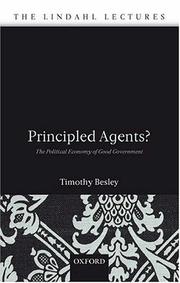| Listing 1 - 4 of 4 |
Sort by
|

ISBN: 1280904682 0191533920 1429491795 9780191533921 9780199271504 019927150X 9781280904684 9780191700279 0191700274 9786610904686 6610904685 019927150X 9781429491792 Year: 2007 Publisher: Oxford : Oxford University Press,
Abstract | Keywords | Export | Availability | Bookmark
 Loading...
Loading...Choose an application
- Reference Manager
- EndNote
- RefWorks (Direct export to RefWorks)
Mainstream policy economics now pays more attention to the delivery of policy outcomes and how incentives and institutional change shape the effectiveness of government. But should these issues be studied against a background of purely self-interested public servants? This book explores this question and more.
Public administration. --- Government productivity. --- Agent (Philosophy) --- Motivation (Psychology) --- Policy sciences. --- Action, Psychology of --- Drive (Psychology) --- Psychology of action --- Psychology --- Agency (Philosophy) --- Agents --- Person (Philosophy) --- Act (Philosophy) --- Philosophy --- Productivity, Government --- Capital productivity --- Production (Economic theory) --- Public administration --- Administration, Public --- Delivery of government services --- Government services, Delivery of --- Public management --- Public sector management --- Political science --- Administrative law --- Decentralization in government --- Local government --- Public officers --- Policy-making --- Policymaking --- Public policy management --- Political aspects. --- Government - General --- Law, Politics & Government --- Political Institutions & Public Administration - General --- Administració pública --- Agent (Filosofia) --- Motivació (Psicologia) --- Ciències polítiques
Book
ISBN: 0262014068 9786613594518 0262289180 1280499281 9780262289184 0262288737 9781280499289 9780262014069 9780262288736 Year: 2010 Publisher: Cambridge, Mass. : MIT Press,
Abstract | Keywords | Export | Availability | Bookmark
 Loading...
Loading...Choose an application
- Reference Manager
- EndNote
- RefWorks (Direct export to RefWorks)
"The narrative of development economics is now infused with discussions of institutions. Economists debate whether institutions-or other factors altogether (geography, culture, or religion)-are central to development. In this volume, leading scholars in development economics view institutions from a microeconomic perspective, offering both theoretical overviews and empirical analyses spanning three continents." "After substantial introductory chapters by Pranab Bardhan and Marcel Fafchamps, two scholars who have published important work on this topic, each of the remaining chapters examines a particular set of institutions in a unique setting. These chapters treat the effects of Angola's violent conflict on that country's development; institutional accountability in Uganda; the effect of Indonesia's ethnic diversity on the distribution of public goods; the impact of trade liberalization on India's investment climate; extended family networks in Mexico; and a microeconomic perspective on land rights in Ethiopia." "The chapters demonstrate the remarkable heterogeneity of institutions, government institutions, and families-as well as the empirical and methodological ingenuity of current research into this crucial topic." "Timothy Besley is Kuwait Professor of Economics and Political Science and Director of STICERD (Suntory and Toyota International Centres for Economics and Related Disciplines) at the London School of Economics. He is the author of Principled Agents? The Political Economy of Good Government. Rajshri Jayaraman is Assistant Professor at the European School of Management and Technology, Berlin."--Jacket.
Economic policy -- Case studies. --- Institutional economics -- Case studies. --- Organizational change -- Case studies. --- Institutional economics --- Economic policy --- Organizational change --- Business & Economics --- Economic Theory --- Economics --- E-books --- ECONOMICS/Microeconomics --- ECONOMICS/Trade & Development
Book
Abstract | Keywords | Export | Availability | Bookmark
 Loading...
Loading...Choose an application
- Reference Manager
- EndNote
- RefWorks (Direct export to RefWorks)
Governments in liberal democracies pursue social welfare, but in many different ways. The wellbeing approach instead asks: Why not focus directly on increasing measured human happiness? Why not try to improve people’s overall quality of life, as it is subjectively seen by citizens themselves?The radical implications of this stance include shifting attention to previously neglected areas (such as mental health and ‘social infrastructure’ services) and developing defensible measures of overall wellbeing or quality of life indicators. Can one ‘master’ concept of wellbeing work to create more holism in policy-making? Or should we stick with multiple metrics? These debates have been live in relation to an alternative ‘capacities’ approaches, and they are well-developed in health policymaking. Most recently, the connections between wellbeing and political participation have come into sharper focus.Wellbeing remains a contested concept, one that can be interpreted and used differently, with consequences for how it is incorporated into policy decisions. By bringing together scholars from economics, psychology and behavioural science, philosophy and political science, the authors explore how different disciplinary approaches can contribute to the study of wellbeing and how this can shape policy priorities.
Book
ISBN: 9781909890817 Year: 2022 Publisher: London : LSE Press,
Abstract | Keywords | Export | Availability | Bookmark
 Loading...
Loading...Choose an application
- Reference Manager
- EndNote
- RefWorks (Direct export to RefWorks)
Governments in liberal democracies pursue social welfare, but in many different ways. The wellbeing approach instead asks: Why not focus directly on increasing measured human happiness? Why not try to improve people’s overall quality of life, as it is subjectively seen by citizens themselves?The radical implications of this stance include shifting attention to previously neglected areas (such as mental health and ‘social infrastructure’ services) and developing defensible measures of overall wellbeing or quality of life indicators. Can one ‘master’ concept of wellbeing work to create more holism in policy-making? Or should we stick with multiple metrics? These debates have been live in relation to an alternative ‘capacities’ approaches, and they are well-developed in health policymaking. Most recently, the connections between wellbeing and political participation have come into sharper focus.Wellbeing remains a contested concept, one that can be interpreted and used differently, with consequences for how it is incorporated into policy decisions. By bringing together scholars from economics, psychology and behavioural science, philosophy and political science, the authors explore how different disciplinary approaches can contribute to the study of wellbeing and how this can shape policy priorities.
| Listing 1 - 4 of 4 |
Sort by
|

 Search
Search Feedback
Feedback About UniCat
About UniCat  Help
Help News
News